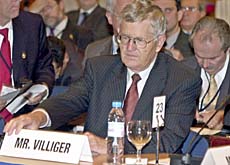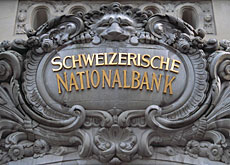IMF gathers in Dubai under Swiss chairmanship

Grim fears about the global economy and the ability of world bodies to stimulate growth are at the centre of this week’s meeting of the International Monetary Fund (IMF).
Switzerland’s finance minister, Kaspar Villiger, became the first Swiss to chair a meeting of the institution’s 184 member states.
Alexander Karrer, ambassador for international relations at the Swiss finance ministry, told swissinfo that the two-day summit in Dubai was an opportunity to refocus world attention on economic problems.
“The kind of signal Dubai can send is one that says trade is important and that liberalisation of trade has brought growth to the economy as a whole,” Karrer said.
Last week, the Washington-based IMF warned that the recent surge in world markets could stall if global imbalances were not addressed quickly.
Kenneth Rogoff, the IMF’s chief economist, said a sustained recovery would be heavily dependent on the United States, which is currently running a growing current account deficit.
“It is bad enough that the global economy has been flying on one engine but it is going to be a lot worse if it has to land on one wheel,” Rogoff said.
Attack on Asia
The Dubai meeting is expected to hear strong calls from the US against China and Japan – two countries Washington blames for keeping their currencies artificially low against the dollar.
US manufacturers have been complaining that the weak Chinese yuan and Japanese yen have hindered competition against Asian importers.
Karrer admitted the issue could cause divisions at Dubai.
However, concerns about Asian currencies are likely to be overshadowed by concerns about the US trade deficit.
“Global prosperity depends overwhelmingly on American demand,” said the Economist in its latest edition.
“If it were to drop significantly, the world would tumble into recession. Yet for years Americans have been spending far beyond their means,” it added.
Sick-man Europe
The failure of Europe – and by default Switzerland – to contribute to the global recovery is also expected to feature heavily at Dubai.
Rogoff last week criticised Europe’s apparent inability to speed up its structural reforms.
Switzerland is also vulnerable. Most experts believe the country’s only hope of recovery lies within its export industries.
“For the moment, most Europeans who want to see an economic recovery will have to watch it on TV,” Rogoff said, referring to the fact that growth was something that was taking place elsewhere.
Karrer said Switzerland agreed with the need for further economic reforms in Europe and elsewhere.
“Structural reform has become a permanent necessity of every economy. What’s important is that there is the political will to see these reforms come to an end,” Karrer said.
Villiger’s role
Switzerland currently holds the rotating chairmanship of the IMF’s board of governors.
“He’s in charge of the discussions, and he will preside over this meeting from beginning to end,” Karrer said.
In recent days, Switzerland has been hosting a meeting of countries that Bern represents at the IMF and World Bank.
The Swiss-led block is made up of Azerbaijan, Kyrgyzstan, Poland, Serbia and Montenegro, Tajikistan, Turkmenistan and Uzbekistan.
IMF’s role
Following the collapse of trade talks in Cancun last week, many are now looking at the role of the IMF.
Non-governmental organisations have called on the fund to become more democratic. Currently 80 of the IMF’s poorest members hold only ten per cent of its voting rights.
Others have questioned the IMF’s lending policies.
During the last eight years, the fund has buttressed troubled economies in Mexico, Asia, Russia, Turkey, Brazil, South Africa and most recently Argentina.
However, the Zurich-based “Neue Zürcher Zeitung” on Friday commented that the IMF had often been too quick to lend money in times of crisis.
“The discipline that is imposed in countries that cannot pay by barring them from further loans, has therefore been weakened,” the paper said.
swissinfo, Jacob Greber in Zurich
The Washington-based IMF has 184 member countries.
It was set up to boost economic growth and employment.
It also gives loans to struggling countries.
This week’s Dubai meeting is likely to be dominated by concerns about the global economy.
Switzerland’s finance minister, Kaspar Villiger, will chair the meeting.

In compliance with the JTI standards
More: SWI swissinfo.ch certified by the Journalism Trust Initiative

You can find an overview of ongoing debates with our journalists here . Please join us!
If you want to start a conversation about a topic raised in this article or want to report factual errors, email us at english@swissinfo.ch.